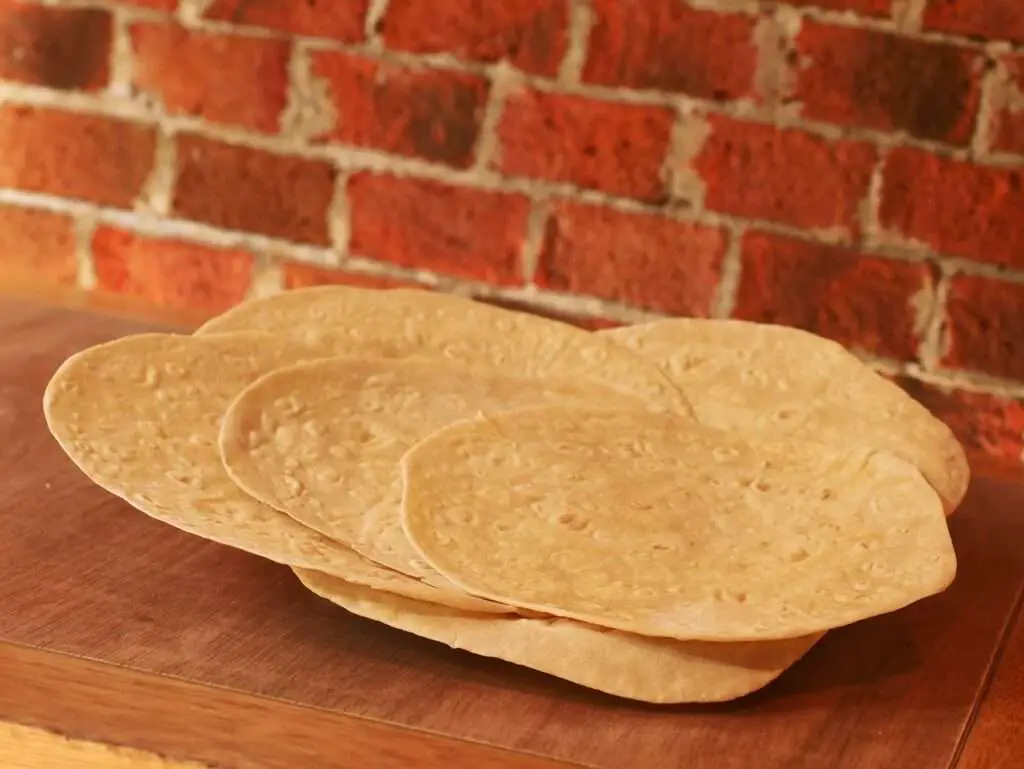Introduction:
The flexible and well-liked flatbread known as a tortilla originated in Mexican cuisine but is now eaten all around the world. Generally speaking, they are thin, hollow, and round, however, other sizes and shapes and nutrition facts of Tortillas are also available.
Numerous flours can be used to make tortillas, including whole wheat, corn, and wheat. Each flour has a unique flavor and texture. These delicate, pliable dough discs are a common dish throughout Latin America and beyond, and they have a rich cultural past.

From more modern wraps and sandwiches to traditional Mexican tacos and quesadillas, tortillas are used in a variety of meals and have nutrition facts of Tortillas. Because they may be filled with a variety of ingredients, tortillas are a convenient option for breakfast, lunch, dinner, or snacks.
Understanding the nutrition information of tortillas will enable you to make educated food decisions and enjoy these delectable flatbreads as a part of a healthy diet, whether you favor the earthy flavor of corn tortillas or the gentle flavor of flour tortillas.
Nutrition Facts of Tortillas:
Calories
The number of calories in a tortilla might change depending on its size, composition, and contents have nutrition facts of Tortillas. Here is a general breakdown of how many calories you may expect from various tortilla varieties:
- Corn Tortillas
- Compared to flour tortillas, corn tortillas are typically smaller in size.
- Large corn tortillas, such as those used for burritos, can have as much as 90–100 calories each.
- A typical 6-inch (15 cm) maize tortilla has about 50–60 calories.
- Flour Tortillas:
- A typical 8-inch (20-cm) flour tortilla provides between 120 and 150 calories. Compared to corn tortillas, flour tortillas are larger and softer.
- A large flour tortilla, which is frequently used to make burritos, can have 200–300 calories.
- Whole Wheat Tortillas:
- Whole wheat tortillas are a nutritious substitute for conventional white flour tortillas.
- An 8-inch whole wheat tortilla offers 130–170 calories, compared to 80–100 for a 6-inch tortilla.
Carbohydrates
The main macronutrient in tortillas is carbohydrates due to the nutrition facts of Tortillas. They give the body energy.
- Corn Tortillas: Compared to other forms, corn tortillas often contain more carbs. An average maize tortilla measuring 6 inches long has roughly 10 to 15 grams of carbs.
- Flour Tortillas: Flour tortillas, especially those produced with refined white flour, have a tad more carbs than other tortilla types. There are roughly 20–25 grams of carbohydrates in an 8-inch flour tortilla.
- Whole Wheat Tortillas: Due to their high dietary fiber content, which lowers blood sugar levels, whole wheat tortillas are a healthy choice. About 15 to 20 grams of carbs are contained in a 6-inch whole wheat tortilla.
Protein
Although it is not as prevalent as carbohydrates in tortillas, protein is still a crucial macronutrient.
- Corn Tortillas: A typical corn tortilla measuring 6 inches long has 1-2 grams of protein.
- Flour Tortillas: An 8-inch flour tortilla typically has 3–4 grams of protein, which is a bit higher.
- Whole Wheat Tortillas: A 6-inch whole wheat tortilla can provide up to 3–4 grams of protein, which is comparable to the amount in flour tortillas.
Fat
Although fat is a macronutrient, it is present in tortillas in very small amounts compared to the amounts of protein and carbohydrates.
- Corn Tortillas: With only 0.5–1 grams of fat per 6-inch tortilla, corn tortillas are typically low in fat.
- Flour Tortillas: An 8-inch flour tortilla typically provides an additional 2-3 grams of fat.
- Whole Wheat Tortillas: With roughly 2-3 grams of fat per 6-inch tortilla, whole wheat tortillas have a similar amount of fat as flour tortillas.
Vitamins & Minerals
Folate (Vitamin B9): Folate is necessary for DNA synthesis and cell division. Tortillas can be a good source of folate, particularly those produced from corn. It is crucial for expectant mothers in particular.
Potassium: Potassium is necessary for nerve messages, muscular contractions, and correct fluid balance. Although they don’t contain much of it, tortillas can help you get your recommended daily intake of potassium by seeing the nutrition facts of Tortillas.

Iron: Tortillas, particularly those made of whole wheat or other whole grains, may contain a trace amount of iron. Red blood cell synthesis and oxygen delivery throughout the body both depend on iron.
Magnesium: Magnesium is important for energy metabolism, bone health, and muscle and neuron function. Particularly whole wheat tortillas can offer a small quantity of magnesium.
Phosphorus: Phosphorus is necessary for many physiological functions as well as the health of bones and teeth. Whole wheat tortillas can have phosphorus in them.
Health Benefits of Tortillas:
When eaten as a part of a balanced diet, nutrition facts of tortillas can provide several health benefits. Here are five advantages of tortillas for health:
Energy source

Carbohydrates, the body’s primary energy source, are abundant in tortillas. Active people and athletes should choose them because they offer a quick and simple source of fuel. Due to its high fiber content, choosing whole wheat or whole grain tortillas can give you sustained energy.
Dietary Fiber
Tortillas made of whole wheat or whole grain are great sources of dietary fiber. Fiber contributes to sensations of fullness, which aids in weight management and decreases overeating. Additionally, it promotes digestive health.
Nutritional Value
Whole wheat or whole grain tortillas, in particular nutrition facts of Tortillas, are high in nutrients such the B vitamins (folate, thiamine, and niacin), iron, magnesium, and phosphorus. These nutrients are crucial for many biological processes, such as cell growth, bone health, and energy metabolism.
Versatile for Healthy Meals
Lean proteins (chicken, fish, and beans), veggies, and good fats (avocado, olive oil) may all be stuffed into tortillas. This adaptability enables you to make meals that are nutritious, balanced, and comprise several different dietary groups, improving your general health.
Gluten-Free Options
Corn tortillas offer a gluten-free substitute to conventional wheat-based tortillas for people who are sensitive to gluten or have celiac disease. This makes it painless for those with gluten intolerance to eat wraps, tacos, and other dishes made using tortillas.
How to Incorporate Tortillas into Diet:
Tasty and nutritious tortillas can be a great addition to your diet. The uses for tortillas are many and they are highly adaptable. Here are some suggestions for adding tortillas to your diet:
Wrap or Burrito: To make a lean wrap or burrito, stuff a tortilla with plenty of veggies (lettuce, tomatoes, bell peppers), lean protein (grilled chicken, turkey, or tofu), and a healthy fat source (avocado, olive oil). For additional fiber and nutrients, you can also include beans, brown rice, or quinoa.
Breakfast Burrito: A wholesome breakfast is a great way to start the day. Tortilla-wrapped scrambled eggs with vegetables like bell peppers and spinach. For more taste, mix it with some salsa or hot sauce.
Salad Wrap: For your salad, use large lettuce leaves or whole wheat tortillas. Your preferred salad ingredients, such as grilled chicken, mixed greens, cherry tomatoes, and a light dressing, should be added to them.
Pizza Substitutes: Use tortillas to create a healthy pizza substitute. Toppings of your choice, tomato sauce, and cheese should be added. Bake or broil until the cheese is bubbling and brown.
Dip Chips: Slice the tortillas into triangles, drizzle with a little olive oil, and bake until crisp. These handmade tortilla chips go great with hummus, salsa, and guacamole.
FAQs:
- Are tortillas free of gluten?
Unlike flour tortillas, which generally contain gluten, corn tortillas are naturally gluten-free.
- What distinguishes corn tortillas from wheat tortillas?
While flour tortillas are created from wheat flour and have a smoother texture, corn tortillas are made from corn masa and have a distinctive flavor.
- How should tortillas be kept to maintain their freshness?
To retain freshness and prevent drying out, store tortillas in the refrigerator in an airtight container or resealable bag.
- Are tortillas freezer-safe?
You can freeze tortillas for longer-term storage, yes. They should be kept in the freezer after being carefully wrapped in plastic or foil.
5.Are tortillas a nutritious addition to my diet?
When chosen properly, such as whole wheat or whole grain kinds, and loaded with nutrient-dense components like veggies and lean proteins, tortillas can be a part of a healthy diet.
Conclusion:
Lastly, when consumed wisely, tortillas are a diverse and universally adored dish that may be a component of a balanced diet. There are many possibilities for making delectable and wholesome meals with tortillas, whether you pick corn, flour, or whole wheat varieties.
You may enjoy the convenience and flavor of tortillas while maintaining a balanced diet by selecting whole-grain versions and stuffing them with nutritious items like lean protein and vegetables.
Keep in mind that your choice of fillings and portion size will have a significant impact on the total nutritional value of any foods you prepare with tortillas.
